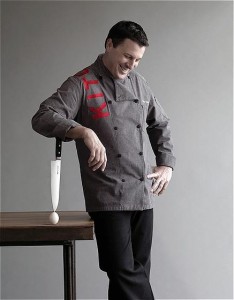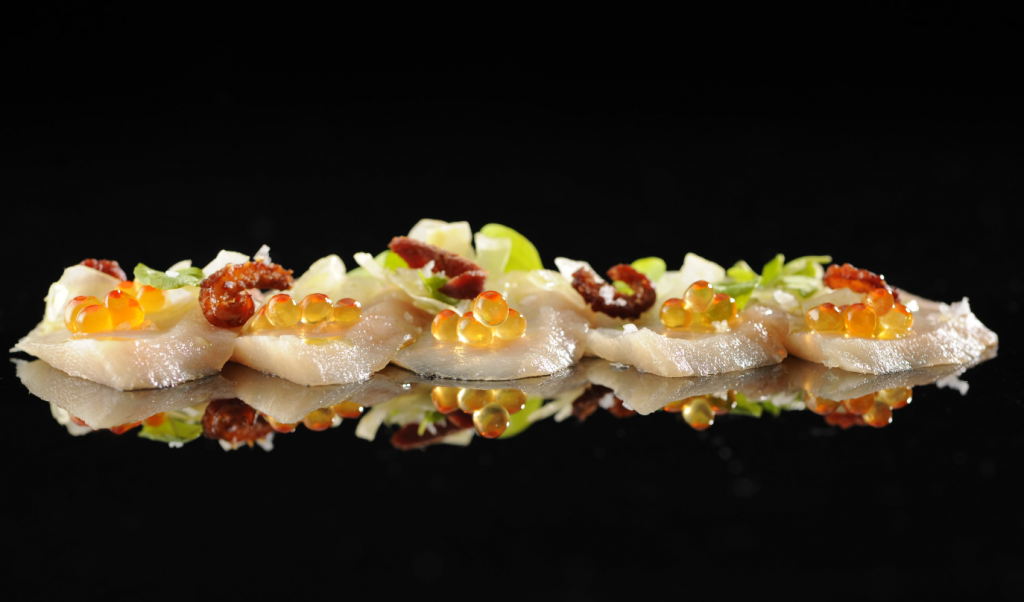Being recognized by the James Beard Foundation as a Rising Star of American Cuisine is only one of Chef Paul McCabe’s impressive achievements in the culinary world. He’s also won Golden Sceptre and Golden Baccus awards from the Southern California Restaurant Writers, the Wine Spectator Magazine Award of Excellence, and his restaurant Kitchen 1540 was named the Best Hotel Dining by San Diego City Search, Best New Restaurant by San Diego Magazine, and hailed as Best Restaurant Service by San Diego’s Ranch and Coast Magazine.
Chef Paul McCabe is the executive chef of the gorgeous L’Auberge Del Mar resort and its Kitchen 1540 restaurant, located in the coastal village of Del Mar in San Diego’s North County. Operating with a a farm to table philosophy, his kitchen proudly serves hormone free beef, sustainable seafood, and fresh local produce according to season. We were thrilled to have the opportunity to interview Chef Paul, and he graciously shared a restaurant recipe with us as well.
Savory Tv: We’ve been reading about your international experience in the culinary world, is there any one region or country that is near and dear to your heart outside of the US? Do you bring this influence to the kitchen at 1540?
Chef Paul McCabe: Spain is a great source of inspiration for me. The variety of ingredients and dining options are found no where else on the planet. You can get great tapas at the markets or small restaurants, the best cured meats and cheeses and Spain has more Michelin star restaurants than any other country. Here at Kitchen 1540, our kitchen is grounded in the craft of our industry, guided by principles of sustainability and creatively motivated by modern cooking techniques.
Savory Tv: We know that you choose local, organic, and sustainable ingredients in your cuisine. Sadly not long ago, a proposed ban for Atlantic bluefin tuna was rejected. Our question for you is: how do you feel about chefs serving non sustainable seafood to satisfy consumer demand?
Chef Paul McCabe: Well, who am I to tell other Chefs what to do or what to serve? I am adamantly against serving non sustainable seafood. We work closely with Kanaloa Seafood, a certified sustainable seafood distributor, to ensure that all seafood we order is from a sustainable source. About six months ago we made the decision to remove all Tuna from L’Auberge and Kitchen 1540 menus and have taken a stand to help save this magnificent Fish. I do believe it’s up to the Chefs and restaurants in this country to help educate the public.
Savory Tv: Do you think that restaurants are moving forward in this regard at all, towards responsibly serving sustainable fish on their menus?
Chef Paul McCabe: Yes! But not fast enough…if we want our grandchildren to see and experience this fish then we must act now!
Savory Tv: With summer quickly approaching, which ingredients are you looking forward to working with?
Chef Paul McCabe: Spring is my favorite season but San Diego farmers are growing some amazing produce! I always look forward to the corn, fava beans, heirloom tomatoes and all the incredible stone fruit.
Savory Tv: Thank you for joining us Chef! Have a wonderful Summer.
Clean Seas Hiramasa Crudo
Compressed Fennel, Sake Cured Steelhead Roe, Duck Cracklings
Ingredients
12 oz Clean Seas Hiramasa
1 Cup Kosher Salt
1/4 Cup Sugar
1/4 Coriander Seeds
Fennel Fronds from one bulb of fennel, chopped
4oz Fennel Bulb, Shaved and compressed in a cryovac machine
.5oz Micro Sorel
.5oz Sake Cured Steelhead Roe
2 Smoked Duck Skin, julienned
1/3 Cup Lemon Vinegar
1 Cup Extra Virgin Olive oil
Method
For the Hiramasa:
Clean the Hiramasa filets and set aside in the refrigerator. Mix the salt, sugar, coriander and fennel fronds in a bowl and mix. Cover the Hiramasa with the salt mixture and let cure for 3 hours. Wash the fish under cold water to remove the salt and pat dry.
For the Duck Cracklings:
Place a heavy bottomed sauté pan over medium heat and add the duck skin and cook until crisp, drain and set aside.
For the Vinaigrette:
Mix the vinegar and olive oil and set aside.
Presentation
Slice the Clean Seas Hiramasa in quarter inch pieces and place six on a rectangular plate. Mix the shaved fennel, sorel and some of the vinaigrette in a bowl and season with salt and pepper. Place the fennel salad on top of the fish and add the roe and duck cracklings and serve.



Find The Best Food On Your Travels
April 6, 2010 at 5:01 am[…] Sustainable Fish: An Interview and Recipe From Chef Paul McCabe | Savory Tv | Delicious chef recipe … […]
Richard
April 6, 2010 at 5:25 amGreat site, great pics!
Sustainable Fish: An Interview and Recipe From Chef Paul McCabe … |
April 6, 2010 at 5:31 am[…] here to read the rest: Sustainable Fish: An Interview and Recipe From Chef Paul McCabe … Posted in recipes | Tags: delicious-sustainable, exclusive-interview, fish-hiramasa, james, […]
Green Earths Energy: Build Amazing Solar Panels Yourself! | DIY Solar Power
April 6, 2010 at 5:50 am[…] Sustainable Fish: An Interview аnԁ Recipe Frοm Chef Paul McCabe … […]
Jessie
April 6, 2010 at 6:30 amohhh what a very elegant dish! great interview too
Five Reasons Florida Resort Jobs Rock | eastwestbakery.com
April 6, 2010 at 1:07 pm[…] Sustainable Fish: An Interview and Recipe From Chef Apostle McCabe … […]
Gera @ SweetsFoodsBlog
April 6, 2010 at 1:51 pmA delicious interview and so interesting that Spain is Paul’s source of inspiration
Cheers,
Gera
Sustainable Seafood and Chefs « Greengirlinc's Blog
April 7, 2010 at 6:59 am[…] Sustainable Fish […]
SippitySup
April 7, 2010 at 3:36 pmThis is a subject that needs to be discussed more. Great interview! GREG
Elizabeth
April 7, 2010 at 11:09 pmPaul McCabe rocks!
Michael Fenster
April 15, 2010 at 6:28 amSuch an important topic.Great article and interview
We need to manage all our resources wisely!